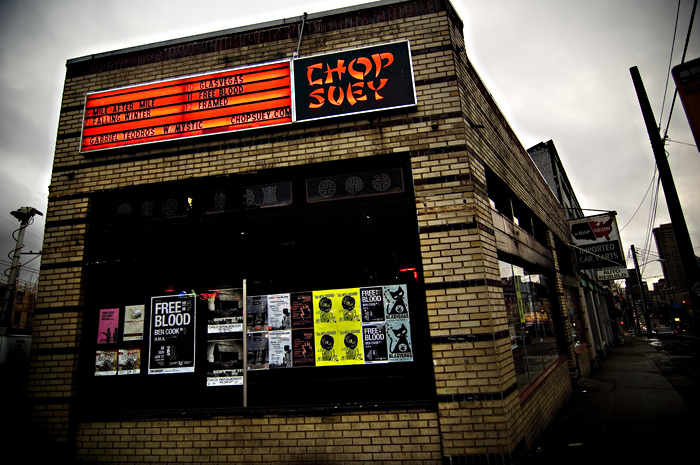Shortly after midnight last Saturday, gunfire erupted backstage during a hip-hop show at Chop Suey on Capitol Hill, leaving Joseph Ryan, aka 29-E, dead and two others hospitalized. According to eyewitness accounts, the gunman gained access to the backstage hallway when a performer responded to a knock at the outside door. At press time, two suspects were in police custody.
“Like a lot of my friends and family, I’ve stood in that hallway and opened [that door] dozens upon dozens of times,” explains Larry Mizell Jr., MC for local hip-hop acts Cancer Rising, They Live, and Night Owls. “It’s how the artists get in the venue, and rappers are always running late, so you gotta listen for that knock. It could’ve been any of us.”
Predictably, local news and culture message boards (including 206Proof, the one founded by Mizell himself) lit up instantly with fingers pointing in every direction. Whether blame was being aimed at Chop Suey, Big Kountry Entertainment (the show’s outside promoter), the city’s lack of attention to a purportedly growing gang-activity problem, or the music itself, grief quickly manifested itself as cries for culpability. Few viewed it as a failure of club security, but many theories abound when looking closer at the root of the tragedy.
“There’s nothing else you could really do in that situation regarding the actual security setup,” notes Neumos owner and talent buyer Steven Severin, a former employee of Chop Suey under different ownership.”I worked at Chop Suey for four-plus years letting artists and promoters into that back door.That’s where they need to be able to go in order to not have to walk through the crowds.I have opened that door hundreds of times, and there’s never been one issue. It is a very unfortunate situation, to say the least, but I don’t think security could have done much, as the gun didn’t make it inside the venue.” Funhouse owner and booking agent Brian Foss echoes Severin’s assessment. “If someone banged on the back door and charged in my bar with guns blazing, there would be nothing I could do except duck,” he says.
“From what I understand, recently there has been a rash of gang-related shootings in the [area near Chop Suey], and I think this was just part of that,” says Glen Rinzler, production manager for Showbox at the Market. “I don’t think the venue could have done anything different to prevent it.” Rinzler was not the only member of the music community to express fears about a gang-violence connection, though many declined to go on the record about their concerns. When asked about the possibility of gang involvement in the shooting, Seattle Police Department spokesperson Mark Jamieson said, “It’s far too early to draw any sort of conclusion without knowing what the motivation was…the good news is that we have several people in custody for this. We believe that they were targeting somebody, but it’s way too soon to say that it was gang-related.”
Severin does see the need for clubs to take responsibility for vetting promoters and performers. “I have been booking hip-hop shows in Seattle for [more than] 10 years, and I know you have to do your research with the artists that you book,” he says.”If something doesn’t seem right from their picture, or just my knowledge that some of their fan base could cause problems, we err on the side of caution and don’t do the show.”
Mizell emphasizes the importance not just of knowing the performers or promoters, but of making sure in-house communication is working on all levels. “There are lots of great hip-hop shows happening all the time, and usually, aside from minor gripes, the club staff, the promoter, and the artists are all on the same page,” he asserts. “But there are occasionally shows—typically done by non-reputable, rookie promoters—which are short on fans but long on dumb homies…all this set against the backdrop of ever-escalating gang violence in the town. These are the shows where there’s the least communication between staff, promoter, and artists. These are the shows, often flying beneath radar, and in truth on the fringes of this city’s hip-hop scenes, where the bullshit usually happens.”
Speaking via phone from Chop Suey’s offices Monday morning, club booking agent Pete Greenberg was obviously distraught and overwhelmed in the shooting’s aftermath, and said he had no reason to believe such a horrific situation could unfold. “We’re trying to look at whether there was anything we could have done to prevent this. I don’t necessarily think there was; it looks kind of random. We worked with [Big Kountry Entertainment] before, and there’s never been an incident. Reached via e-mail, Big Kountry’s Mark Schatzer said “Never at any time would Big Kountry Entertainment put on or promote a show that would put artists or their fans at risk of violence. I never could have foreseen this senseless act of violence occurring. My heartfelt condolences and prayers go out to the family and friends of those suffering during this tragedy.”
Whenever loss of life and hip-hop intersect, reflexive issues of race, the glorification of violence, and the role of pop culture as a political force rise to the surface with so much ferocity that it can be difficult to get to the heart of what needs to change. However, I think Foss sums up the big picture quite nicely. “What happened at Chop Suey was awful. Violence at any show is awful. But I think this gun problem is bigger than the Seattle music scene.”








